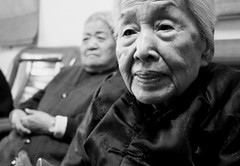 Image by sheilaz413 via Flickr
Image by sheilaz413 via Flickr
A June 6, 2009 New York Times
article by John Leland highlighted the economic stress being felt by family caregivers.
The economic crisis has spread its pain widely, but it has placed special stresses on the estimated 44 million Americans who provide care for an elderly or disabled relative or spouse, many of whom have already made themselves financially vulnerable trying to balance work and family. Many like Ms. Denk, who stepped away from the work force, are now facing ever-bleaker prospects.
Teresa Denk is 59 years old and lives with her father, a former mechanic who is 92 and requires constant care. Ms. Denk has not held a full-time job since 2000, when her mother developed
cancer and required her daughter’s full-time care. Asked how she meets her monthly expenses, she said, “I do a lot of praying.”
In a recent survey of 1,005 caregivers, one in six said they had lost a job during the downturn, and 21 percent said they had to share housing with family members to save money. The survey was conducted by the National Alliance for Caregiving and Evercare, a division of the UnitedHealth Group, which provides long-term health care.
In many cases these caregivers, who rely on help from the government and nonprofit organizations to make ends meet, are finding that such services are being cut in the downturn and have had to assume even more care-related expenses.
“All the calls we’re getting are, ‘Is there money to assist me, either pay me to be a caregiver or assist me in other ways, like provide pro bono services,’ ” said Suzanne Mintz, president of the National Family Caregivers Association. [NFCA has a good resource for caregivers on their web site,
Messages to Live By.]
Caregivers spend an average of $5,500 a year as part of their responsibilities, not counting lost wages, according to a 2007 survey by the National Alliance for Caregiving.
Caregivers are encouraged to take steps to keep themselves healthy, talk about their challenges, and
seek ways to reduce stress. Many organizations are starting support groups for caregivers, including the Alzheimer's Association and Family and Children's Services.
Caregivers can obtain information and advice from the following web sites:
 We are seeing more articles about the challenges of the sandwich generation - individuals who are caring for aging parents as well as their own children.
We are seeing more articles about the challenges of the sandwich generation - individuals who are caring for aging parents as well as their own children. 
![Reblog this post [with Zemanta]](http://img.zemanta.com/reblog_e.png?x-id=3dcacd16-d8b3-474f-a6d4-f0fdd671d137)

![Reblog this post [with Zemanta]](http://img.zemanta.com/reblog_e.png?x-id=ff5323ef-fbd6-49b4-80d8-269bd963e68b)